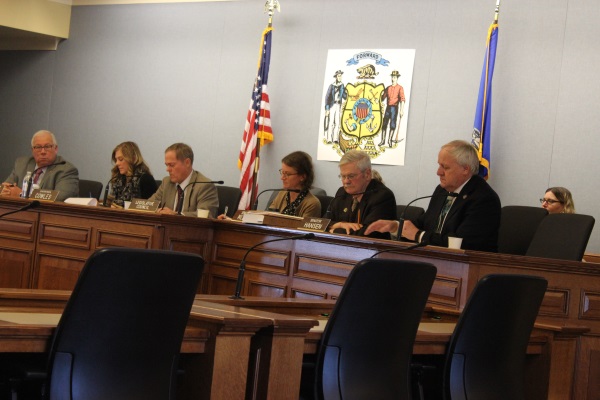State senators talk about Assembly Bill 118 and the ongoing burial-sites preservation effort
By Tim Wohlers

Three state senators shared their thoughts on Assembly Bill 118 inside the capitol last month, following a meeting of the Committee on Natural Resources and Energy.
If signed into law, the bill would increase protection of Wisconsin burial sites.
“This is an important bill,” said Senator Robert Cowles (R-Green Bay), who chairs the committee. “It comes on the heels of another bill in the previous session which didn’t show the proper protection for burial sites.”
The previous bill, Assembly Bill 620 (AB620) would have allowed landowners to bore into Native American effigy mounds so that they could challenge the existence of human remains.
The proposal received heavy criticism from the sponsor’s fellow legislators, and Native American tribes.
“What they tried to do with the burial mounds before was atrocious,” said Senator Dave Hansen (D-Green Bay). “And the tribes really stepped up and said, ‘This isn’t right.’”
Hundreds of activists gathered at the capitol to protest AB620 while it was making its way through the Assembly. Due to such heavy opposition, the measure would never make it to a vote.
Nevertheless, the failed proposal would draw attention to the existing statute pertaining to burial-site preservation – which dates back to the 80s, and makes no mention of effigy mounds.
To address the outdated law, Legislative Council formed a study committee to draw up new legislation.
“It was good bipartisan work,” said Sen. Luther Olsen (R-Ripon). “It’s good that all interested parties sat down together and compromised, and came up with the bill that we have today.”
The study committee helped state representatives draft the current proposal – AB 118. It would increase the amount of land surrounding a burial site that one cannot disturb, and require sellers to disclose the presence of any such sites on their property.
The majority of Wisconsin legislators have praised all the hard work put into the bill, and have voiced their support.
“Everybody came together,” Senator Hansen said, “worked together and came up with a solution. And I think it’s the solution that is going to make a difference going ahead.”
He and his fellow senators could be voting on the measure as soon as March, he said.
Home